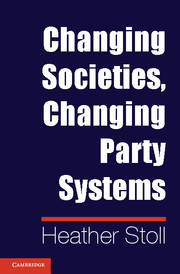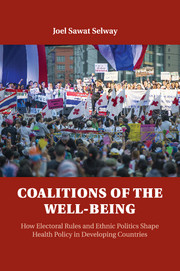Changing Societies, Changing Party Systems
$120.00 (C)
- Author: Heather Stoll, University of California, Santa Barbara
- Date Published: November 2013
- availability: Available
- format: Hardback
- isbn: 9781107030497
$
120.00
(C)
Hardback
Other available formats:
Paperback, eBook
Looking for an examination copy?
This title is not currently available for examination. However, if you are interested in the title for your course we can consider offering an examination copy. To register your interest please contact [email protected] providing details of the course you are teaching.
-
How do changes in society that increase the heterogeneity of the citizenry shape democratic party systems? This book seeks to answer this question. To do so, it focuses on the key mechanism by which social heterogeneity shapes the number of political parties: new social groups successfully forming new, sectarian parties. Why are some groups successful at this while others fail? Drawing on cross-national statistical analyses and case studies of Sephardi and Russian immigration to Israel and African American enfranchisement in the United States, this book demonstrates that social heterogeneity does matter. However, it makes the case that to understand when and how social heterogeneity matters, factors besides the electoral system – most importantly, the regime type, the strategies played by existing parties, and the size and politicization of new social groups – must be taken into account. It also demonstrates that sectarian parties play an important role in securing descriptive representation for new groups.
Read more- Develops the most extensive data set on social heterogeneity to date (longitudinal and going beyond ethnicity)
- More general than many other studies, combining statistical analyses with case studies; explores the effect of several variables; draws evidence from many countries and time periods; and studies different types of social heterogeneity
- Takes one of the first steps towards differentiating between the effects of social heterogeneity in the electoral districts and at the aggregate (national) level, complementing the recent surge of interest in sub-national analyses in comparative politics
Customer reviews
Not yet reviewed
Be the first to review
Review was not posted due to profanity
×Product details
- Date Published: November 2013
- format: Hardback
- isbn: 9781107030497
- length: 351 pages
- dimensions: 243 x 161 x 24 mm
- weight: 0.64kg
- contains: 31 b/w illus.
- availability: Available
Table of Contents
1. Introduction
2. Social heterogeneity and the number of parties: a theory
3. Describing social heterogeneity: measures and testable hypotheses
4. Social heterogeneity and party system fragmentation: empirical evidence across space and time
5. Israel: new parties for new groups?
6. Israel: testing hypotheses about sectarian party success
7. The United States: new parties for new groups? Testing hypotheses
8. Conclusion: party system fragmentation and beyond.
Sorry, this resource is locked
Please register or sign in to request access. If you are having problems accessing these resources please email [email protected]
Register Sign in» Proceed
You are now leaving the Cambridge University Press website. Your eBook purchase and download will be completed by our partner www.ebooks.com. Please see the permission section of the www.ebooks.com catalogue page for details of the print & copy limits on our eBooks.
Continue ×Are you sure you want to delete your account?
This cannot be undone.
Thank you for your feedback which will help us improve our service.
If you requested a response, we will make sure to get back to you shortly.
×





